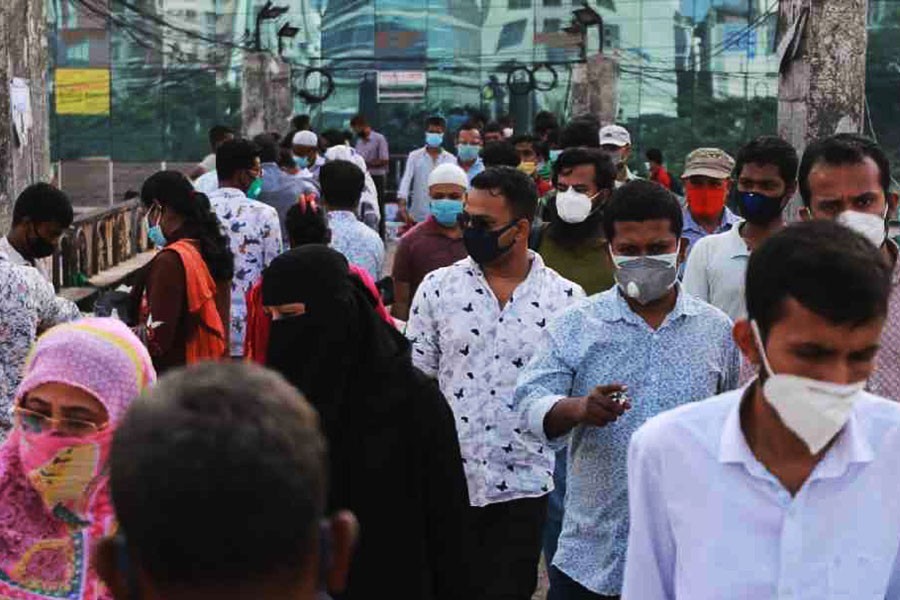
Published :
Updated :

The SARS-CoV-2 variant Omicron is wreaking havoc across the world, at least, in terms of infection rate. Bangladesh is no exception.
The daily infection rate has more than tripled over the last couple of weeks. Though the number of daily death is still low, the actual effect of the fast-spreading infection, in terms of fatality, could be known within the next two to three weeks.
The government, meanwhile, has put into effect a fresh 11-point restriction on public movement, gatherings and business activities to contain the surging infections.
The restrictions include mandatory wearing of masks in public places and transports and production of vaccine cards while taking foods in restaurants and staying in residential hotels. The passenger transports such as buses, trains and launches, according to the government-declared restrictions, will have to operate at half their capacity.
There is no certainty about the effectiveness of all these restrictions as most people have a habit of ignoring the same. It is hard to believe that they would change their habit this time also.
A section of health experts thinks that Omicron, despite being virulent, is far less lethal than Delta and its predecessor variants. However, a final say on the issue is yet to come and the World Health Organisation (WHO) has, thus, advised caution.
So, under the prevailing circumstances, a few restrictions are necessary to contain the surging infections. The country's health system might face a difficult situation if Covid patients in their large numbers start rushing to hospitals. The country's health system had almost collapsed during peak Covid infections in the middle part of last year. Everybody must be aware of that.
However, a few of the fresh restrictions do deserve scrutiny. The first one is the production of the vaccine cards while taking food inside restaurants. Those people who have conceived the idea of enforcing this restriction, it seems, do not have any idea of how the eateries operate.
The posh restaurants and hotels, which are only a few in numbers, might ensure compliance. It will not be possible for thousands of small restaurants and hotels that are run by illiterate or half-literate employees and owners? The restaurant owners have demanded the withdrawal of such an absurd idea.
Another restriction---operating passenger buses at half the capacity---appears to be an impractical decision. The government deserves appreciation for not giving in to pressure from the bus owners to compensate for running at half the capacity by hiking their fares. People are already aggrieved by the latest 27 per cent raise and any further increase in the fare would hit them hard.
What will happen to many commuters if the buses operate at half their capacity? Most office-goers will have to skip office or hire expensive auto-rickshaws or Ubers to reach their destinations.
It is necessary to ensure physical distance while travelling by public transports. But the authorities cannot be oblivious of the plight of the commuters, the office goers in particular. The government might think of restoring the previous decision to allow half of the workforce of private and public officers to work from their homes by rotation. This would help ensure safety at workplaces and also reduce the number of commuters on the roads.
Given the attitude prevalent among the people towards the health safety protocols, the government needs to remodel its strategy to create greater public awareness. It should involve community-level organisations, private and public, with the campaign. People are used to listening to these organisations more than bureaucrats and others. Such involvement will not cost the government much. What is necessary is the will of the policymakers to carry forward the tasks.
zahidmar10@gmail.com


 For all latest news, follow The Financial Express Google News channel.
For all latest news, follow The Financial Express Google News channel.